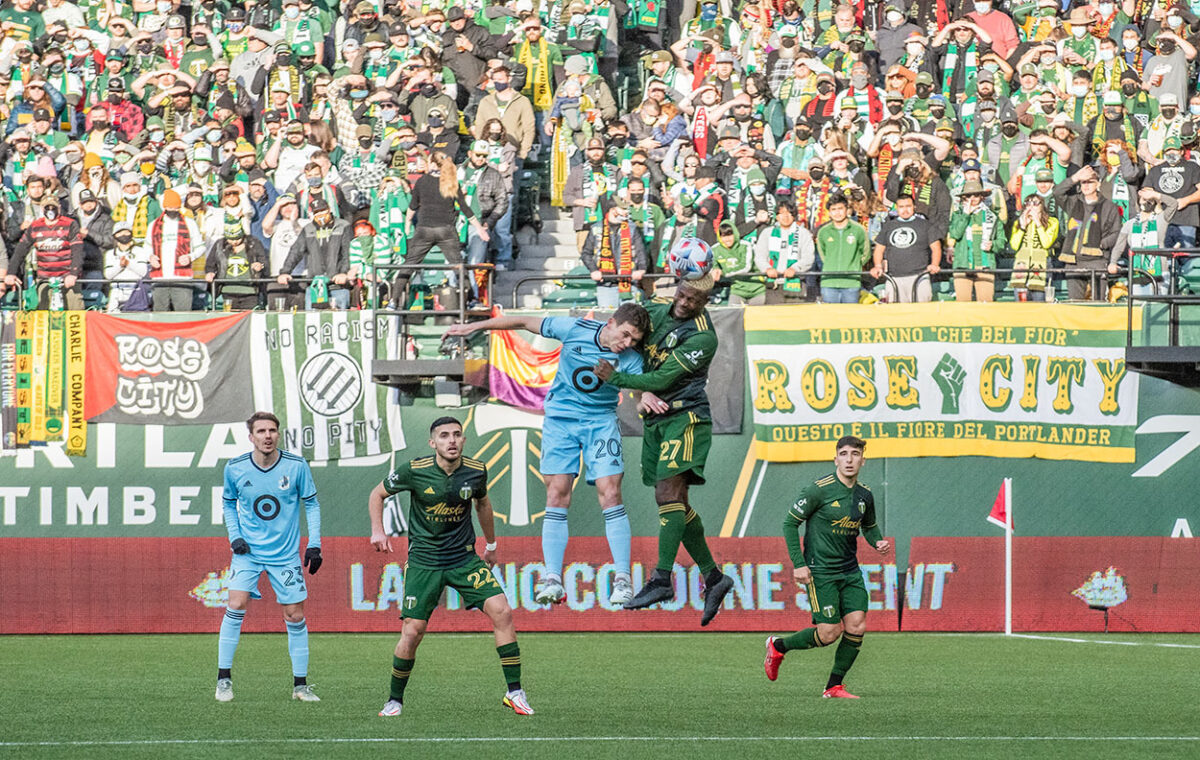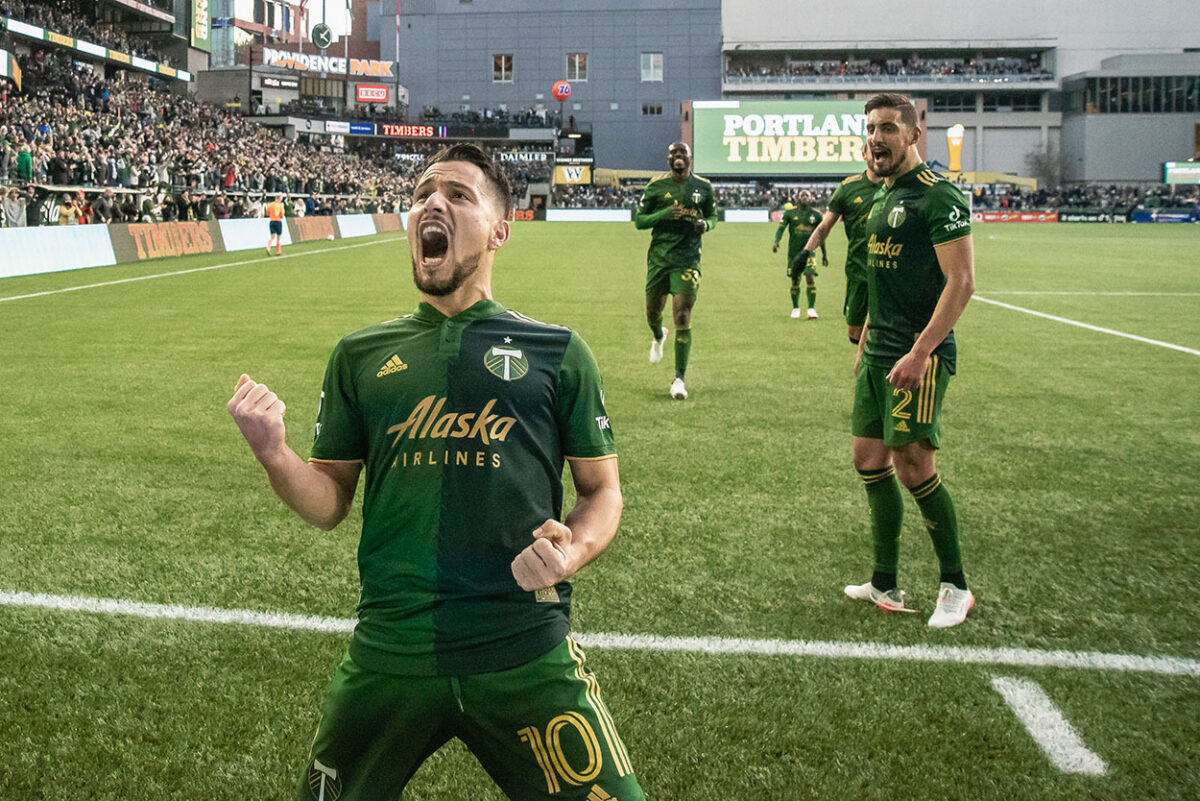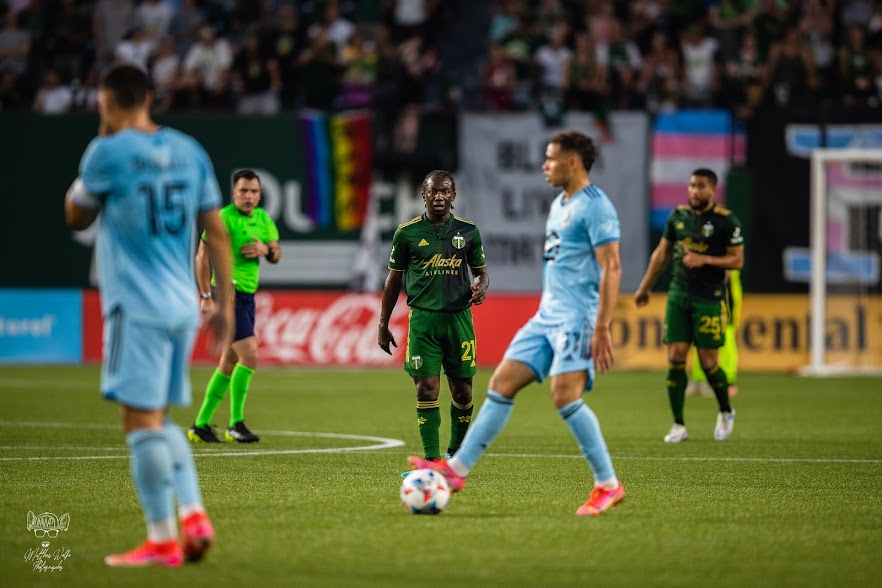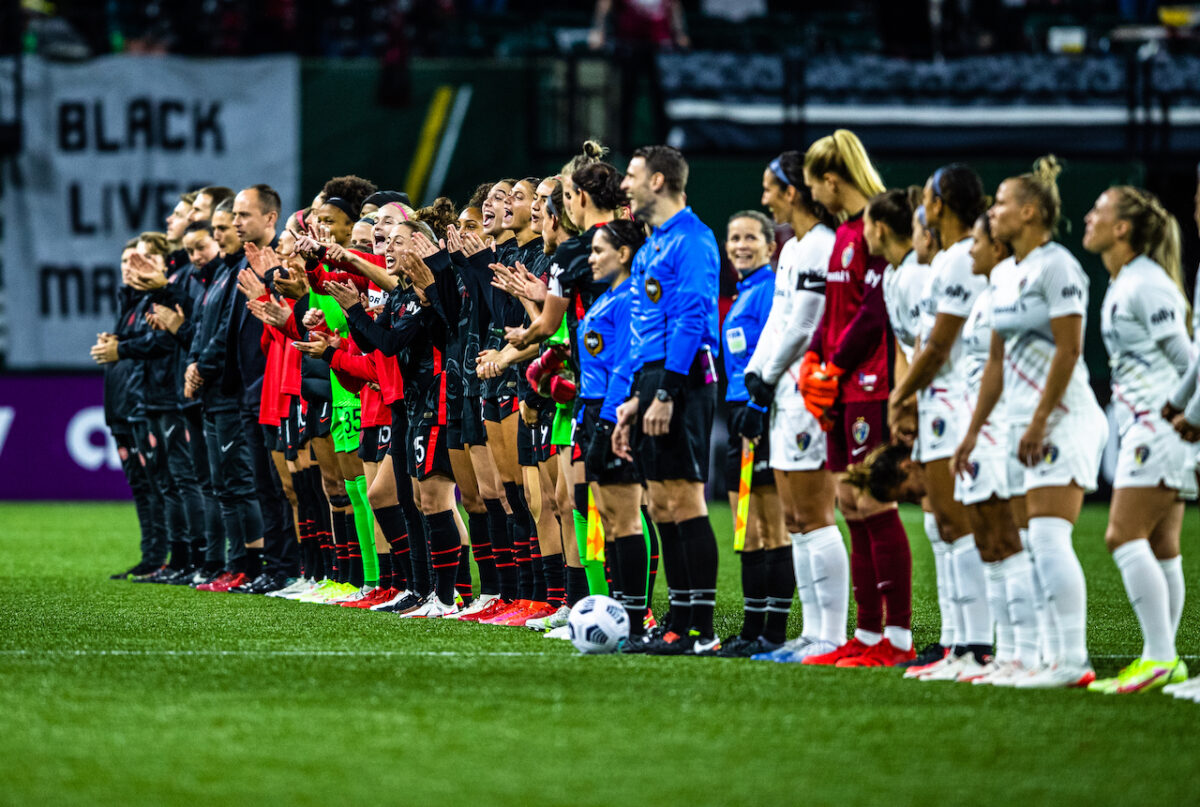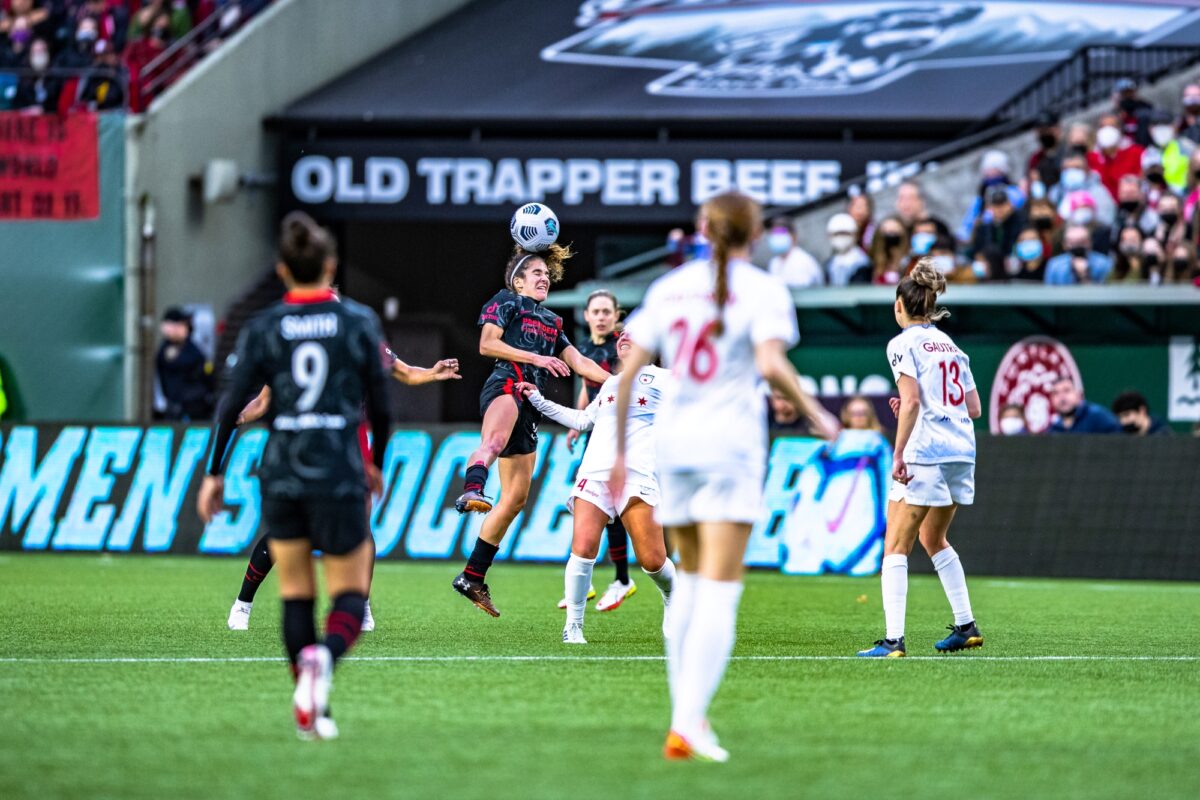Sebastián Blanco’s last memorable MLS Cup Playoff moment came in November 2018.
With Portland behind 1-0 on aggregate and in Kansas City, the club needed a lifeline to extend its season — at least one more game. In the 52nd minute Blanco provided one, seemingly out of nothing, with a right-footed shot that swerved and dipped above the outstretched fingertips of Sporting Kansas City goalkeeper, Tim Melia.
The goal silenced the crowd at Children’s Mercy Park and left Diego Valeri with both hands on his head, speechless. Blanco’s moment of individual brilliance sparked a 3-2 road victory that helped the club reach its second-ever MLS Cup Final.
Three years later, Blanco delivered his latest playoff statement, scoring a second-half brace in the Timbers 3-1 win against Minnesota United to help his team advance to the Western Conference semifinals.
“I think the entire team had a strong performance tonight, but there were those moments that we took that [Blanco] was able to find to take our quality to a higher level,” head coach Giovanni Savarese said. “He definitely brought the magic into the game to give us the edge that we needed.”
Blanco lives for those moments. Earlier in that 2018 playoff run, the Argentine scored a 78th-minute goal in Seattle, which proved crucial in sending the game to added time after Raúl Ruidíaz’s goal in the 93rd minute. In last season’s MLS is Back tournament, Blanco’s timely goals helped Portland win its most recent trophy.
But not even a month after Portland beat Orlando City in the tournament final, Blanco tore his ACL. He couldn’t play in the Timbers’ home playoff match against FC Dallas, which they lost on penalties.
In his return to playoff action, Blanco appeared a step slow right out of the gates. A few touches went awry, passes weren’t perfect and, at one point, he even skied a free kick from right outside the box.
Blanco’s afternoon this past weekend seemed destined to be cut short, too, after a foul in the first half kept the midfielder on the turf and prompted the medical staff to come out onto the field with a stretcher. Blanco got up under his own power, however, and he finished the first half. Then, at halftime, Blanco reset.
His first goal came in the 47th minute, when he put his laces through the ball on a half-volley that sped past the reaching arms of goalkeeper Dayne St. Clair. Those who paid close attention could observe visible pain on Blanco’s face as he grabbed his back amid the celebration. Still, he stayed in the game.
The Timbers game plan ahead of the match was to exploit space between the lines in Minnesota United’s formation. More specifically, Savarese wanted Blanco, Dairon Asprilla and Yimmi Chará to continue to push and play into space between the Loons midfield and defense. The most evident example of this came in Blanco’s second goal.
Reminiscent from his strike on that November night in Kansas City, Blanco took a few touches in those spaces between the lines before firing a shot from outside the box that swerved, hit the top-right post and deflected into the back of the net to give Portland a 3-1 lead. No Minnesota defender even attempted to close Blanco’s space down.
The Argentine made his curtain call in the 88th minute, replaced by Santiago Moreno. As he walked off the field to a rapturous applause, Blanco took a moment to reflect.
“I worked a lot for this moment,” Blanco said. “It’s been a long time for me waiting for this.”
While Blanco’s two second-half goals made the difference in the final scoreline, the Timbers’ win came down to more than their designated player firing on all cylinders in the second half.
Portland wouldn’t have won without the 90-minute effort of Asprilla, who consistently turned “50-50” balls into “70-30” situations. His aggression to fight for loose balls and willingness to drive at Loons defenders allowed his team to build dangerous possession. If not for Minnesota defender Bakaye Dibassy’s perfectly timed foot placement, Asprilla could have finished the afternoon with a first-half goal.
The Timbers eventually did equalize in the waning moments of the first half. Just minutes before his towering header tied the game at one, defender Larrys Mabiala attempted a bicycle kick that required a goal-line clearance. Throughout nearly a three-minute stretch, Portland fans grew louder in voice as their team mounted so much pressure that the Loons defense cracked.
Mabiala played an outsized role in helping the Timbers shut down Minnesota United’s front four. Other than scoring the early goal, Minnesota United never felt as if it had a foothold in the game and a large part of that was because of the defense. In the team’s last four games, all wins, Portland has given up just two goals.
And, ahead of the defense, sat Christhian Paredes and Diego Chará, who both more than held their own, especially against the Loons talented designated player, Emanuel Reynoso. Paredes, especially, put fans on notice with his defending. A few of his challenges even sparked a threatening Timbers’ counterattack.
“The energy and support that we received today was the extra energy for us to push forward, get the result and take care of business,” Savarese said.
When Portland went down a goal in the 11th minute Sunday afternoon, it would have been easy for them to fall victim to the moment and momentum, especially considering the opponent: Minnesota United has been the Timbers’ bogeyman over the years, with seven wins and just two losses against Savarese’s team before Sunday.
“We’ve proven that we can win there,” Loons head coach Adrian Heath said shortly after his team made the postseason by virtue of Real Salt Lake beating Sporting Kansas City in the final moments of Decision Day.
In practices leading up to the game, Savarese and his staff stressed the importance of not allowing Minnesota to get in behind the fullbacks and get a cross off — but that’s how they found the opening goal.
The goal came through Franco Fragapane, who tapped in a squared ball from Romain Métanaire after the winger raced into the space vacated by outside back Claudio Bravo. Loon players celebrated like a team that knew how one-sided the matches between the two clubs have been. They may have even let their foot off the gas — because after that goal, Minnesota United didn’t generate many other chances.
Portland could have easily allowed the deficit to snowball; something they’ve done in some of their more lopsided defeats back in the summer. Instead, they scored three unanswered goals.
“There was no pressure, there was only the disappointment that we allowed them in the only attack that they had to be able to score,” Savarese said. “But we knew that we were going to fight through that, and we needed to play our match.”
Added Blanco: “We started losing the game, and after that we played very mature. We created many chances and after we scored the second goal, we were still playing with the same intensity.”
What’s next for the Timbers? They travel to Colorado for a Western Conference semifinal matchup against the Rapids at 1:30 p.m. on Thanksgiving day.
“They have a very, very good team at home,” Blanco said. “They’re very strong and we have only four days to prepare for that game. We focus now on the game and try to rest at home before tomorrow getting ready for the next game.”
So as the final whistle sounded on the Timbers’ win and children and family poured out onto the Providence Park field, there was an understandable sense of jubilation as players breathed a sigh of relief.
The Loons may well continue to have Portland’s number going forward. It still says something that before Sunday night, their last defeat to the Timbers came in April 2018. But in the first game between the two clubs with actual stakes attached to it, the Timbers took care of business to keep their season alive.
“We’ve never beat Minnesota in the last two years,” Blanco said. “But playoff games are different than the regular season.”

